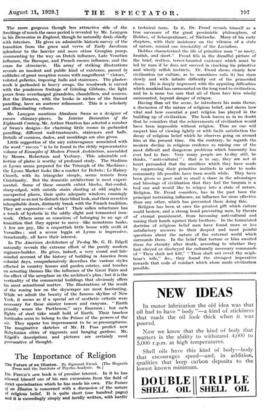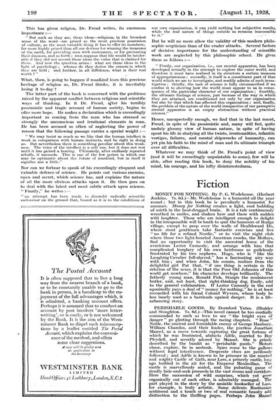The Importance of Religion
DR. FREUD'S new book is of peculiar interest. In it he has allowed himself one of his rare excursions from the field of
strict specialization which he has made his own. The Future of an Illusion is concerned with a discussion of the nature
of religious belief. It is quite short (one hundred pages) and it is exceedingly simply and lucidly written, with hardly
a technical term. In it, Dr. Freud reveals himself as a true successor of the great pessimistic philosophers, of Hobbes, of Schoepenhauer, of Nietzsche. Many of his early chapters, with their insistence on the vileness of a state of nature, remind one irresistibly of the Leviathan.
Hobbes characterized the life of primitive man " as nasty, brutish, and short." Freud fills in the dreadful picture of the brief, restless, terror-haunted existence which must be led by man if he does not succeed in checking his primitive and wholly selfish instincts. Dr. Freud shows clearly how civilization (or culture, as he sometimes calls it) has risen slowly and with infinite difficulty out of the primordial chaos. He is deeply impressed with the appalling difficulties which mankind has surmounted on the long road to civilization, and he is none too sure that all of them have been wholly surmounted, beyond danger of relapse.
Having thus set the scene, he introduces his main theme, a discussion of the nature of religious belief, and shows how vital and how essential a part religion has played in the building up of civilization. The book leaves us in no doubt that he considers that the achievements of civilization would have been impossible without religion. Thus no one will suspect him of viewing lightly or with facile satisfaction the decay of religious belief which he observes going on around him at the present time. On the contrary, he regards the modern decline in religious credence as raising one of the most difficult and dangerous problems which humanity has ever had to face. Very many people are to-day still, he thinks, " anti-cultural " ; that is to say, they are not at heart persuaded that the sacrifices which they have made by suppressing their primitive instincts in order to make community life possible have been worth while. They have been given so poor and so small a share in the advantages and blessings of civilization that they feel the bargain is a bad one and would like to relapse into a state of nature. Religion, Dr. Freud considers, has in the past been the principal restraining influence, an influence far more effective than any other, which has prevented them doing this.
• Religion has been at once the greatest gift which culture could bestow, and a strong bond preventing men, by threats of eternal punishment, from becoming anti-cultural and raising their hands against their brothers. In the formulated doctrine of religious belief men have found more or less satisfactory answers to their deepest and most painful questions about the nature of the external world which surrounds them. In the belief that torture or bliss awaited them for eternity after death, according to whether they had obeyed or disobeyed the culturally necessary commands of " Thou shalt not kill," " Thou shalt not covet thy neigh- bour's wife," &c., they found the strongest imperative towards that code of conduct which alone made civilization possible. This has given religion, Dr. Freud writes, its enormous Importance :- " But such as they are, these ideas—religious, in the broadest sense of the word—are prized as the most precious possession of culture, as the most valuable thing it has to offer its members; far more highly prized than all our devices for w�nnng the treasures of the earth, for providing men with sustenance, or for preventing their diseases, and so forth ; men suppose that life would be intoler- able if they did not accord these ideas the value that is claimed for them. And now the question arises : what are these ideas in the light of psychology ; whence do they derive- the esteem in which they are held ; and further, in all diffidence, what is their real worth ? "
What, then, is going to happen if mankind loses this precious heritage of religion as, Dr. Freud thinks, it is inevitably losing it to-day ?
The latter part of the book is concerned with the problems raised by the apparent conflict between religious and scientific ways of thinking. In it Dr. Freud, after his terribly pessimistic and tragic account of human society, begins to offer more hope. He makes a declaration which is exceedingly important as coming from the man who has stressed so strongly the unconscious and irrational elements in man. He has been accused so often of neglecting the power of reason that the following passage carries a special weight :- " We may insist as much as we like that the human intellect is weak in comparison with human instincts, and be right in doing so. But nevertheless there is something peculiar about this weak- ness. The voice of the intellect is a soft one, but it does not rest until it has gained a hearing. Ultimately, after endlessly repeated rebuffs, it succeeds. This is one of the few points in which one may be optimistic about the future of mankind, but in itself it signifies not a little."
Nor can we forbear to speak of his exceedingly eloquent and valuable defence of science. He points out various enemies, open and secret, which science has, and explains the nature of all the more obvious attacks upon it. He then goes on to deal with the latest and most subtle attack upon science. " Finally," he writes :- " an attempt has been made to discredit radically scientific endeavour on the ground that, bound as it is to the conditions of our own organization, it can yield nothing but subjective results, while the real nature of things outside us remains inaccessible to it." _ - - But he will no more allow the validity of-this modern philo- sophic scepticism than of the cruder attacks. Several factors of decisive importance for the understanding of scientific work are neglected by this philosophic school. He gives them as follows :- "Firstly, our organization, i.e., our mental apparatus, has been developed actually in the attempt to explore the outer world, and therefore it must have realized in its structure a certain measure of appropriateness ; secondly, it itself is a constituent part of that world which we are to investigate, and readily admits of such inves- tigation ; thirdly, the task of science is fully circumscribed if we confine it to showing how the world must appear to us in cense- quence of the particular character of our organization ; fourthly, the ultimate findings of science, just because of the way in which they are attained, are conditioned not only by our organization but also by that which-has affected this organization ; and, finally, the problem of the nature of the world irrespective of our perceptive mental apparatus is an empty abstraction without practical interest."
Hence, unexpectedly enough, we find that in the last resort, Freud, in spite of his pessimistic and, many will feel, quite unduly gloomy view of human nature, in spite of having spent his life in studying all the twists, irrationalities, infantile vestiges, failures, and mental shipwrecks of humanity, can yet pin his faith to the mind of man and its ultimate triumph over all difficulties.
Whatever we may think of Dr. Freud's point of view (and it will be exceedingly unpalatable to some), few will be able, after reading this book, to deny the nobility of his mind, his courage, and his lofty disinterestedness.





























 Previous page
Previous page